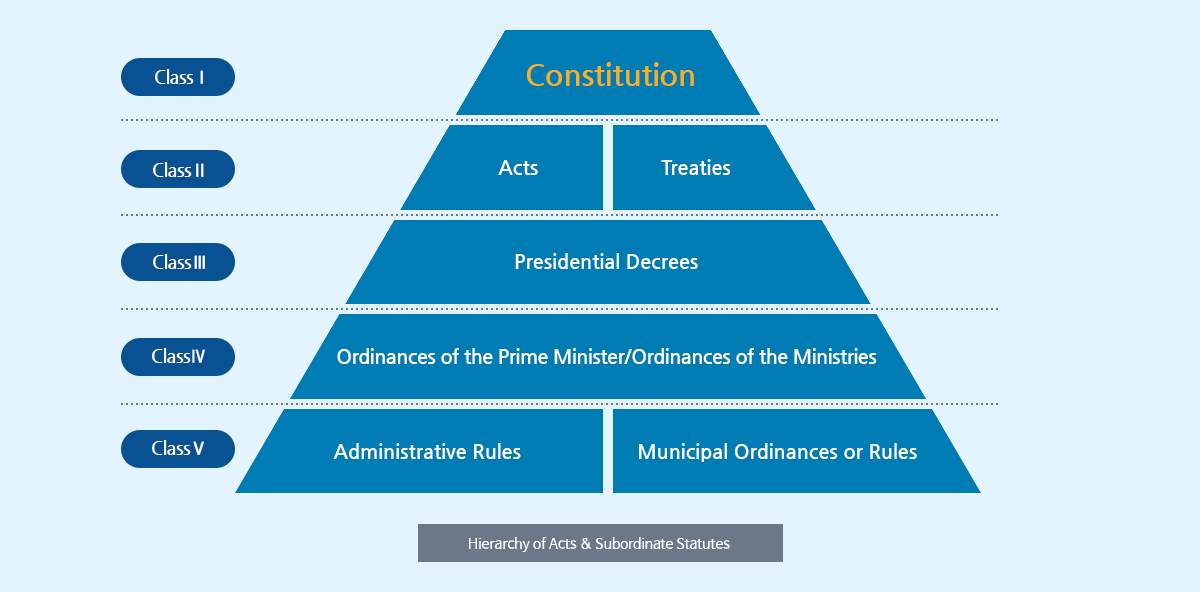Korean Legislation System
The Korean Legislation system consists of the Constitution as the paramount law, Acts for realizing the constitutional values, and administrative legislation including Presidential Decrees, Ordinances of the Prime Minister, Ordinances of the Ministries and so forth for effectively enforcing the Acts.
Since Korean statutes form a specified hierarchy, subordinate statutes enacted under powers delegated by Acts or for enforcing Acts shall not be in contradiction to such Acts.
Categories of Statutes
Constitution
The Constitution, as the paramount law, stipulates fundamental matters pertaining to the rights and duties of the people, structures of the Government, economic order, management of elections, etc.
The Constitution serves as the standard and legal basis for enacting and amending all the subordinate statutes of the Republic of Korea.
If an Act, Presidential Decree or any other statute is deemed in violation of the Constitution, the Constitutional Court makes a decision on unconstitutionality of the relevant statute by referring to the provisions and preamble of the Constitution and interpreting the basic constitutional notions.
Acts
Acts are statutory instruments enacted by the National Assembly that is the basis for the principles of legality and legislated taxation, the requirements for acquiring Korean nationality, expropriation and indemnity of property rights, the establishment of Ministries, the categories of local governments, etc.
The right or freedom of the people may be restricted by Acts only when it is deemed necessary for the purpose of ensuring national security, public order or public welfare; even when restricting any right or freedom of the people, the essential elements will be protected.
Emergency executive orders and emergency financial and economic executive orders are issued by the President in the event of any national emergency; they have the effect of Acts only when reported to and approved by the National Assembly.
Treaties
Treaties mean agreements concluded in writing among nations, and generally accepted international laws refer to international customs, the enforcement power of which is generally recognized in the international community.
Treaties concluded and promulgated under the Constitution and generally accepted international laws have the same effects as those of domestic laws.
Orders
Orders refer to all statutory instruments enacted by administrative power.
Presidential Decrees issued by the President, the head of the Executive, consist of delegated orders and execution orders.
The jurisdiction of such orders extends over all administrative affairs of the Executive.
Ordinances of the Prime Minister are enacted with respect to matters under the jurisdiction of the Ministry of the Interior and Safety, the Ministry of Personnel Management, the Ministry of Government Legislation, the Ministry of Patriots and Veterans Affairs, etc.
which are administrative agencies under the direct supervision of the Prime Minister among the ministries of the Executive.
Ordinances of the Prime Minister are generally viewed to stand on par with Ordinances of the Ministries in their hierarchy.
Administrative Rules
Administrative Rules are established by administrative agencies for the purpose of establishing internal guidelines for the performance of duties or to conduct affairs.
Municipal Ordinances or Rules
As Municipal Ordinances or Rules are affiliated with autonomous local governments, local governments enact such Ordinances or Rules.
 Hierarchy of Acts and Subordinate Statutes, Class1 Constitution, Class2 Acts, Treaties, etc, Class3 Presidential Decrees,
Class4 Ordinances of the Prime Minister/Ordinances of the Ministries, Class5 Administrative Rules, Municipal Ordinances or Rules.
Hierarchy of Acts and Subordinate Statutes, Class1 Constitution, Class2 Acts, Treaties, etc, Class3 Presidential Decrees,
Class4 Ordinances of the Prime Minister/Ordinances of the Ministries, Class5 Administrative Rules, Municipal Ordinances or Rules.